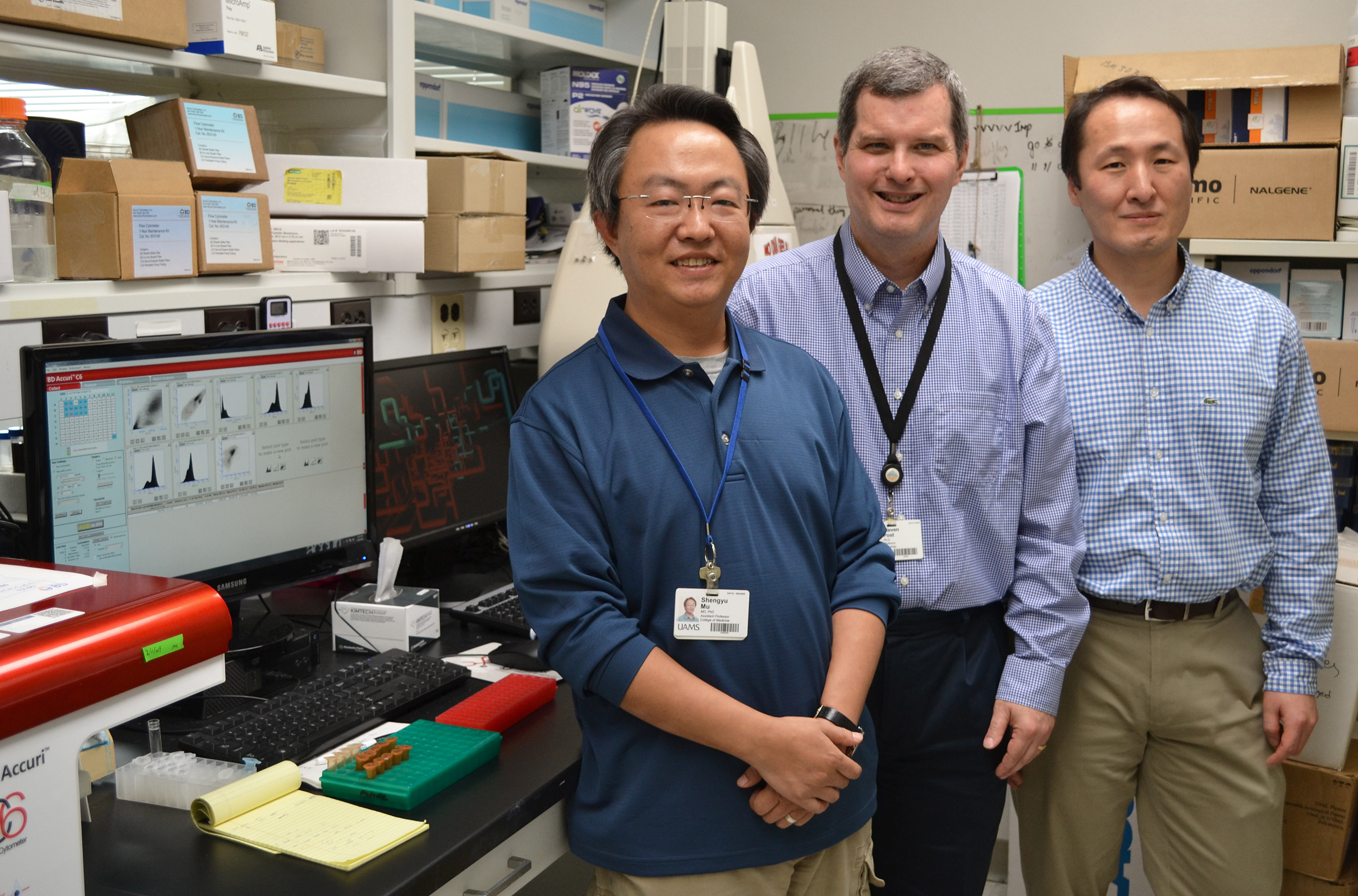Researcher Receives Grant to Continue Work on High Blood Pressure as Immune Disorder
| A University of Arkansas for Medical Sciences (UAMS) researcher who is seeking an explanation for why millions of people worldwide do not respond to the current available treatments for high blood pressure has received $1.89 million from the National Institutes of Health to continue this groundbreaking work.
Shengyu Mu, Ph.D., assistant professor in the Department of Pharmacology and Toxicology in the UAMS College of Medicine, has devoted his career to understanding the causes behind this common condition. His lab has found evidence to support an emerging theory that the salt-sensitive variety of high blood pressure may actually be an immune disorder.
“Twelve years ago, no one believed there was an immune connection behind salt-sensitive hypertension,” Mu said. “Now it’s a hot topic. My lab has found evidence to suggest this, as have labs at Vanderbilt, Wisconsin and Duke universities. A picture is coming together, and the next step is understanding exactly how it works so we can pave the way for designing immunological strategies of treatment.”
More than 1 billion people worldwide have high blood pressure. In the United States, one in every three adults is living with high blood pressure. It is the leading cause of heart disease and stroke, which are major causes of death in the United States.
Although there are many drugs available to treat high blood pressure, fewer than 50% of patients are able to control their blood pressure with the current options. The work of Mu and others indicates that new drugs targeting the immune system could be key.
“Hypertension is a silent killer. By the time most patients find out they have it, it’s already caused damage,” Mu said. “It is important to identify unknown mechanisms involved in the pathogenesis of high blood pressure so we have better options for treating this life-altering and deadly condition.”
Mu’s lab previously found that immune cells, white blood cells called T lymphocytes (T cells), can infiltrate the kidney and stimulate excessive salt retention, resulting in blood pressure elevation.
Mu was able to pinpoint the overall process: When too many of a major subtype of these T cells interact directly with — and actually touch — the cells located in the area of the kidneys that reabsorb salt, the kidney’s absorption of salt increases, thereby impairing the function of the kidneys to filter out excessive salt. Salt-sensitive high blood pressure is the result.
With this current five-year NIH grant, Mu aims to provide, for the first time, evidence and mechanisms of how these T cells interact with kidney cells. Specifically, he will identify the key molecules involved in the interaction between T cells and kidney cells. He will define the signaling pathways involved when the process goes wrong and results in disordered immune activity.
“Dr. Mu’s work has the potential to effect positive change for millions of people,” said Nancy J. Rusch, Ph.D., professor and chair of the Department of Pharmacology and Toxicology. “Hypertension is a common — and frustrating — condition to treat, with major impacts on global population health. Dr. Mu’s breakthroughs in this area are invaluable, and we are gratified to see that the NIH recognizes the importance of supporting his vanguard research.”
In his work, Mu has been aided by Yunmeng Liu, Ph.D., a postdoctoral research associate, and Sung Rhee, Ph.D., an associate professor, both in the Department of Pharmacology and Toxicology; and Steve Post, Ph.D., a professor in the Department of Pathology.
Before coming to UAMS in 2013, Mu received his medical degree from TianJin Medical University in China and a Ph.D. from the University of Tokyo in Japan. Previously, his work has been published in Nature Medicine, the Journal of Clinical Investigation and Nature Communications. He has received the New Investigator award and the Research Recognition award from the American Heart Association and the American Physiology Society for his contributions to research.
UAMS is the state’s only health sciences university, with colleges of Medicine, Nursing, Pharmacy, Health Professions and Public Health; a graduate school; a hospital; a main campus in Little Rock; a Northwest Arkansas regional campus in Fayetteville; a statewide network of regional campuses; and eight institutes: the Winthrop P. Rockefeller Cancer Institute, Jackson T. Stephens Spine & Neurosciences Institute, Harvey & Bernice Jones Eye Institute, Psychiatric Research Institute, Donald W. Reynolds Institute on Aging, Translational Research Institute, Institute for Digital Health & Innovation and the Institute for Community Health Innovation. UAMS includes UAMS Health, a statewide health system that encompasses all of UAMS’ clinical enterprise. UAMS is the only adult Level 1 trauma center in the state. UAMS has 3,275 students, 890 medical residents and fellows, and five dental residents. It is the state’s largest public employer with more than 12,000 employees, including 1,200 physicians who provide care to patients at UAMS, its regional campuses, Arkansas Children’s, the VA Medical Center and Baptist Health. Visit www.uams.edu or uamshealth.com. Find us on Facebook, X (formerly Twitter), YouTube or Instagram.###

